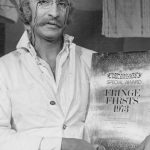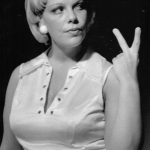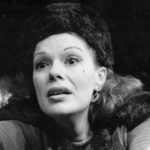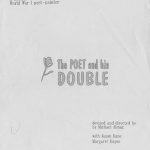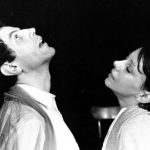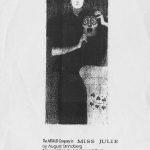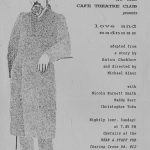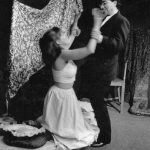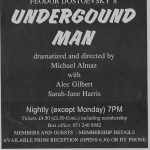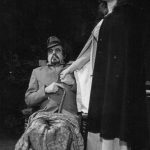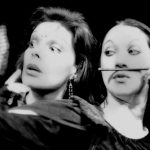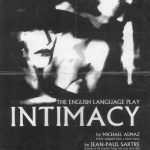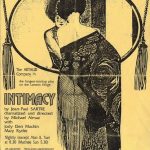Company name: The Artaud Company (sometimes Artaud Theatre Company)
Established: 1973
Founders: Michael Almaz, David Mouchtar-Samorai, Fiona Moore
Reason: When a double bill of Monsieur Artaud and Dreyfus on Devil’s Island, created by Michael Almaz, David Mouchtar-Samorai and Fiona Moore, was invited to tour America, they needed to form a company…
Current status: The Artaud Company produced work until 1991 when it changed its name to the Cafe Theatre. Last performances by the Café Theatre were in 1996.
Area of Work: New Writing. Original plays by Michael Almaz and his adaptations of other works, including: Ionesco, Strindberg, Chekhov, Camus, Moliere, Knut Hamsun, Diderot, Kierkegaard, Kafka, Dostoyevski, the Marquis de Sade.
Policy: Emphasis on collaboration and innovation – prepared to break taboos and speak about the unspeakable
Structure: Cooperative
Based: London
Funding: None. Box office.
Performance Venues: Many regional and European venues. London (1973 – 80): ICA, Oval House, Drill Hall, Soho Poly, Arts Theatre , King’s Head; as well as several shared–use venues in Central London in Soho, Leicester Square (Notre Dame Hall next to the Prince Charles cinema), St Martin’s Lane, Bloomsbury. c 1980 a permanent home was found above The Bear and Staff Pub, Charing Cross Road. Finally in 1991 the company, by now re-named Café Theatre, set up its theatre and café at the London Ecology Centre and Art Gallery in Covent Garden.
Audiences: General public. Groups of university students studying classic novels came to see the adaptations, including a party of elderly women from Calgary in Northern Canada. Drama college students in Munich were sent by their tutors to see Masoch (1976). Tourists and office workers came every day in great numbers to the lunch-time and evening shows. There was one show at lunch-time, two in the evening.
For more images see Michael Almaz web page.
Company and work process:
In 1972, Michael Almaz, fellow Israeli David Mouchtar-Samorai and his wife Fiona Moore, decided to do a play together about Antonin Artaud called Monsieur Artaud. Its success at the Edinburgh Festival in a double bill with Dreyfus on Devil’s Island the following year, and their subsequent invitation to tour the plays in the US, provoked them to adopt The Artaud Company as their company name.
Michael was a prolific writer, writing many new plays and adapting existing texts – something he had done since his youth in Tel Aviv. He directed the Artaud Company and then the Cafe Theatre with the help of Associate Directors from 1973-1996. Tomek Borkowy helped to run it from 1983 – 86, followed by Kerry Irvine, who assisted until 1996, when it finally closed.
Michael met his wife Pam Martell in 1971 when she was working at the LSE across the road from Bush House, where he was a journalist and broadcaster. They met in the BBC canteen where the menu was international and more to her taste. Michael introduced Pam to his views on theatre and, as a political activist, she was drawn to his political and revolutionary theatre. His play Paper Tiger, for example, was an outrageous feminist farce. Pam organised a production at the LSE, which was a big hit with all the students! Pam went on to co-ordinate all the Artaud Theatre tours, publicity and photography, casting, stage direction including costume, set and lighting designs.
Key company members
Many actors worked with the Artaud Company over the years. The make up was constantly changing and evolving. Michael Almaz wrote many of the plays, some with specific actors in mind, giving them the opportunity to show their full range.
Four actors stand out:
David Mouchtar Samorai: David Mouchtar-Samorai and his wife Fiona Moore acted in Monsiuer Artaud and Dreyfus on Devil’s Island at the Edinburgh Festival in 1973, prior to touring the USA. David directed Inquisition and other plays by Michael. (David was born in 1942 in Bahgdad, taken to Israel as a small child by his parents. He later studied in London. David, and Michael co-founded and ran the Martev Theatre in Tel Aviv. They later founded with Fiona Moore, the Artaud Theatre Company together in London in 1973.)
Sally Willis: Michael wrote 5 plays for Sally to perform, 4 of these were solo shows. She toured Europe with these plays to great acclaim between 1974 and 1977. For more on their work together see Interview with Sally Willis and Michael Almaz‘s interviewee page.
Colin Kaye: Colin came to Shaftesbury Avenue to audition. Pam had chosen him from the now defunct PCR (Professional Casting Report) because he reminded her of David Mouchtar-Samorai! Colin gave a fluent performance of astonishing brilliance and power and went on to perform in the plays David had previously made famous.
Tomek Borkowy started work with Michael as an Assistant Stage Manager at the Café Theatre Upstairs, at the Bear and Staff Pub in the West End. He progressed rapidly through Stage Manager to Co-Director and worked closely with Michael in London and Edinburgh between the years of 1983 and 1990.
(Listen also to Tomek Borkowy audio extract)
Intimacy
One play that stands out is Intimacy, which earned the title of ‘the longest running play on the fringe’ – it ran from 1981 to 1996. Originally directed by Michael, it was also directed by Tomek in countries as far flung as Poland and Czechoslovakia. The play was based on Jean Paul Sartre’s story, Intimacy, the complex, competitive, love-hate relationship between two young Parisienne women, Lulu and Rirrette, frighteningly often reflected in the off-stage relationship between the two actresses! The play attracted so much interest that it was attended by the likes of theatrical luminaries such as Dustin Hoffman, Lindsay Anderson (he loved Pam’s Bakewell tarts) and Terence Stamp.
Personal appraisal and thoughts:
Read Michael Almaz’s quote on the Artaud Company, his audio extract on Intimacy and the Café Theatre, and his video extract on how he began writing in Tel Aviv, all on his Interviewee page.
See our Interview with Sally Willis on her Artaud Company work.
Pam Martell: ‘I remember it was at the Café Theatre Downstairs in one of the shared venues, The Notre Dame Hall in Leicester Square. The audience sat at tables with check covers (I still have one of them), with candles. I made the cakes myself then. Lindsay Anderson’s favourite was Bakewell tart which he had with orange juice.’
John Grillo: ‘I first worked for Michael in 1968 playing Rasputin in The Rasputin Show at the Brighton Combination, transferring for a short run at the Arts Theatre, Newport Street. In 1971 or 1972 I played Marx in Anarchist at the Theatre Upstairs, The Royal Court. Two or three months later, I appeared in a double bill of Michael’s at the King’s Head, although I can’t remember what the plays were called. Was it Inquisition? I enjoyed appearing in all these plays.’
Reviews:
Letters From K and Story
‘Michael Almaz writes … as if taking on the mantel of Brecht … against the grain, not from the viewpoint of the hero but from a worm’s eye view, from below: he switches our gaze onto the mere object of a great man of literature’s attention, Felice Bauer. .. Sally Willis’ Felice was a thrillingly exact portrayal of a woman already in a state of pre-marital matronhood, twisting her handkerchief, scattering aspirins, biting her nails….and in her confrontation with the purely ‘literary existence’ of Kafka, she begins with mounting terror to detect a part of her own alienation. For, through long years of waiting for her fiance from Prague (Felice worked in Berlin), vacillating between abhorrence and longing, she begins to behave ‘like one of his characters’…. After the (brief 3 minute) interval in Story, Sally Willis is completely transformed with a blonde wig, pink lips and shiny (white) leather boots, half-naked, invitingly bursting out of all her seams, now whorish, now randy, now childlike and innocent and both together as she lasciviously licks her finger and inserts a sweet into her mouth…Here she is once again waiting in a room…without windows or doors, locked in, having been stood up…’Don’t you like me? I have never been rejected!’ She is hounded by the tape-recording (playing uninterruptedly on the tape recorder in full view). It is the tape of her own inner voice; meanwhile she is forced to her knees and then throatily abused by several male shadows. What Miss Willis here performs with gesture and mime, the convulsions of her stomach, of her terror, of her weeping and laughter, the vulgar splaying of her legs and the charmingly modest in-turning of her feet sounds like just one more case of unbridled virtuosity, but on stage it looks quite different, quite astonishing and beautiful. In contrast with her portrayal of the uptight and tortured Felice in the first play, Sally Willis’ sensual performance is experienced less and less as a theatrically induced reflex in the loins and more and more as a powerful communication from her most lucid awareness.’ (Die Süddeutsche Zeitung, Münchner Kultur Bericht, 8th January 1975)
‘The two pieces make an exceedingly clever pair, and something cleverer still, in presenting through a highly literate work of art, the case of life against art.’ (Glasgow Herald, 1974)
Masoch
‘More a force of nature than theatre: Sally Willis at the Off-Off Theatre’ (Thomas Betz, Die Süddeutscher Zeitung, Münchner Kulturberichte, 1975)
Intimacy
‘In the sparse setting of the Cafe Theatre, both actresses (Catherine Curzon and Mary Pringle) give enchanting performances. Lulu’s optimistic disillusionment contrasting well with Rirette’s more materialistic attitudes. It’s a charming example of small-scale theatre.’ (David Patterson, 1988, publication unknown)
*The Production Table only shows the very early years shows at present and is under development*
Productions:
| PRODUCTIONS | VENUES | DATES |
|---|---|---|
| Monsieur Artaud Writer: Michael Almaz Director: Michael Almaz Cast: David Mouchtar-Samorai & Fiona Moore | Edinburgh Festival, tour of USA | 1972 |
| Dreyfus on Devil's Island Writer: Michael Almaz Director: Michael Almaz Cast: David Mouchtar-Samorai | Edinburgh Festival, tour of USA | 1973 |
| Memoirs of a Witch Writer: Michael Almaz Director: Michael Almaz Cast: Sally Willis | De Lantaaren Theatre, Rotterdam | 1974 |
| Letters from K and Story Writer: Michael Almaz Director: Michael Almaz Cast: Sally Willis | Edinburgh Festival, De Lantaaren Theatre, Rotterdam, Theater an der Winkelwiese, Zurich, The Off-Off Theatre, Munich, tour of Belgium and Luxembourg, Die Rampe, Berne, Das Alte Theater, Stuttgart, Traverse Theatre, Edinburgh, ICA, London, venue at Covent Garden, London | 1974-77 & 1979 |
| Masoch Writer: Michael Almaz Director: Michael Almaz Cast: Sally Willis | De Lantaaren Theatre, Rotterdam, The Off-Off Theatre, Munich, Palais des Beaux Arts, Brussels, venue in Holland, Das Alte Theater, Stuttgart, venue in High Holborn, London | 1975-77 & 1980 |
| The Friend Writer: Michael Almaz Director: Michael Almaz Cast: Sally Willis | Traverse Theatre, Edinburgh, ICA, London | 1977 |
Interviewee reference: Michael Almaz. Pam Martell and Sally Willis were interviewed to assist in the development of this page. If you would like to hear their interviews please contact us for details.
Existing archive material: Pam Martell
Bibliography:
Every Number Wins by Michael Almaz in The Best Short Plays 1968 ed. Stanley Richards (Philadelphia/ NY/ London: Chiltern Book Company, 1968)
In the King’s Bosom: a Biblical Comedy by Michael Almaz in One Act (London/ NY: Evans Brothers Ltd, 1965)
Kafka’s Judgement by Michael Almaz (London: Covent Garden Plays, 1987)
Unpublished Plays include:
Across the Border
The Rasputin Show (1968)
Cut!
The Port Said Performance (later at Royal Court, 1972)
The F&H Play (Traverse and Royal Court, 1974)
Smash Zed (based on the anti-semitic forgery the Protocols of the Elders of Zion)
Intimacy (based on a story by Jean Paul Sartre),
Underground Man (based on Dostoevsky)
Dialogue with a Dying Man (adapted from the Marquis De Sade)
The Lord (and Master) in the Brothel (from Lautreamont)
The Anarchist Collection:
Anarchist (about Marx, Nikolay Ogarev, Nechaev and Bakunin)
Sailor (about Emma Goldman’s arrival in the US)
Chicago Sunday School for Anarchists (about the so-called Chicago Haymarket Outrage)
The Friend (about George Sand and Marie Dorval)
Auto Auto
Dreyfus on Devil’s Island
Diary of a Rat
Letters from K (1974)
Memoirs of a Witch (1974)
Paper Tiger
Play Cocteau (adapted from Cocteau)
Eve
Cow in the Desert (on the trafficking of young Russian women to Middle East)
Other Writings include:
From Avant-Garde to National Theatre in The Jewish Quarterly vol 28, no 1 (Spring 1980)
Acknowledgements concerning those who helped create the page: This page was written by Pam Martell and Sally Willis and constructed by Carole Mitchell. November 2013
The creation of this page was supported by the National Lottery through the Heritage Lottery Fund.

